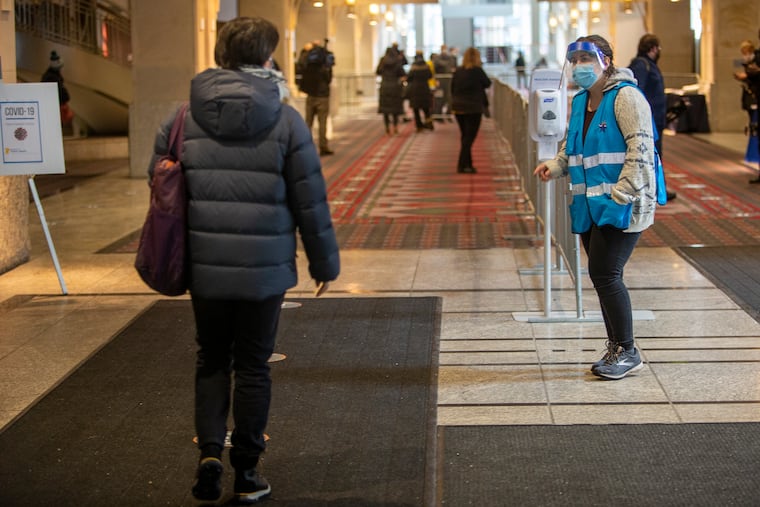Philly residents have to go online to sign up for the coronavirus vaccine. But what about people who can’t?
The patchwork system for registering and making appointments has left out some of the city’s oldest residents, as well as low-income or immigrant residents who face digital or language barriers.

Philadelphia launched a preregistration website for the coronavirus vaccine last month, allowing residents to get in the virtual line for inoculation.
But it also left some people out. Residents must have internet access to register, and the form is only available in English and Spanish.
Residents who are 75 or older, along with people with certain health conditions, are currently eligible for vaccination in Philadelphia. But many are struggling to sign up — or are registering on multiple waiting lists but still not getting appointments. And the city’s bureaucracy has proven especially difficult for some of the most vulnerable to navigate.
The problem isn’t unique to Philadelphia — Pennsylvania’s vaccine rollout has also struggled to reach some groups. But the patchwork system for registering and making appointments has left out some of the city’s oldest residents, as well as low-income or immigrant residents who face digital or language barriers, while residents who are better equipped to navigate the system get appointments.
A nine-person call center
City Councilmember Bobby Henon said at a hearing last week that even 311 — a phone hotline specifically meant to help residents with a variety of government-related issues — added to the confusion for some of the more than 1,500 seniors who called his office.
Henon said 311 is “letting people know what they have to go online, but the reason they called is that they can’t go online.”
Philadelphia Managing Director Tumar Alexander said the city is working to address that issue with 311 and have residents leave their phone numbers so the health department can get back to them.
The health department’s call center (available at 215-685-5488), has only nine staff members answering phones to help residents complete the online form. Health department spokesperson James Garrow said the call center has been receiving three times its normal call load. The city is working to increase staffing and have 20 full-time workers taking calls, he said.
Garrow said the city also hopes the 311 call center can soon begin helping residents with vaccine registration.
“This has to do with staffing and capacity,” Garrow said. “We’ve seen in other cities and states that throwing open a call center without capacity to handle the influx of calls can lead to frustrating waits.
» READ MORE: No phone hotlines, multiple websites, long lines: Getting a COVID-19 vaccine is confusing in Pa. and N.J.
The city is also using the staff from its Philly Counts initiative, which helped find hard-to-reach residents to complete the U.S. Census, for vaccine outreach and communication. Alexander said those outreach workers “were working in very vulnerable and hard-to-reach communities” and can now apply that experience to the vaccine.
But even for residents who do manage to preregister online, the wait continues. Bob McCann, an 83-year-old in the city’s Rhawnhurst section, said his daughter registered him and his wife online. But he’s still repeatedly calling councilmembers, various city offices, and pharmacies. He’s desperate for an answer on when he may be able to get an appointment.
“If you tell me I’m not going to get the vaccine for five more years, at least we would have an answer,” McCann said. “Well we don’t have an answer, and I’ve become very upset.”
Language barriers
Garrow said the city is working to add Chinese, Vietnamese, and French to the available languages for online registration.
Councilmember Maria Quiñones-Sánchez said she’s concerned about ongoing access issues in the city’s immigrant communities due to language and literacy issues. She said she had to help many of her own family members sign up on the city’s website, and urged officials during last week’s hearing to form a better plan for addressing inequities.
“The numbers are still just going to continue to bear out that our communities that are most vulnerable are going to be last,” she said.
Oni Richards-Warity, executive director of the African Family Health Organization, said at last week’s Council meeting that the city should partner with groups like hers to reach people who speak limited English or mistrust of the health-care system. Since the beginning of the pandemic, she said, “the messaging was very much targeted not to that demographic.”
» READ MORE: Lack of targeted outreach, translated materials leaves Latino community behind as Pa. struggles with vaccine rollout
Richards-Warity said her organization, which serves immigrant communities, has been trying to help communicate about the coronavirus and the vaccine but would like to have a formal partnership with the city.
“Our staff are able to craft messages,” she said, “that resonate with our community.”